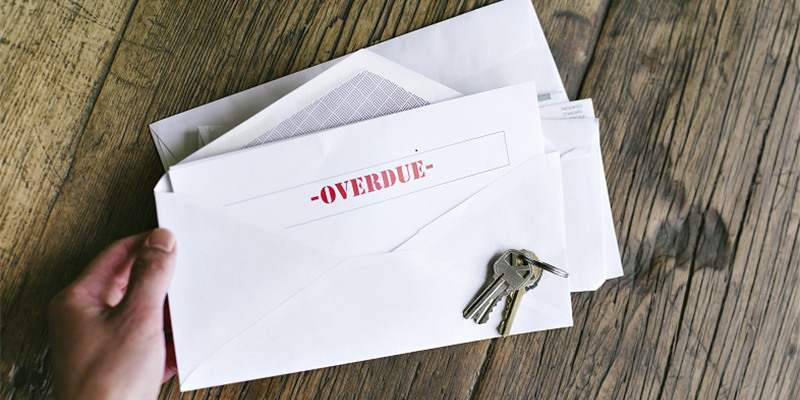Late rent is something that every landlord has encountered. But, how exactly should you handle late rental payments?
How to Deal With Late Rent
Landlords come across different kinds of tenants. Some tenants are exceptional payers, making sure to never miss a rent deadline, whereas other tenants are unfavorable, always sending in their rent late. There are, of course, some tenants that fall somewhere in the middle — paying their rent on time on some months and late on others.
Considering that rent is a landlord’s main source of income, it is understandable to feel frustrated whenever a tenant of yours pays their rent past the deadline. After all, you also need to pay your bills or risk penalties.
While it is the tenant’s responsibility to pay their rent on time, there are some things you can do to encourage this. First of all, you should communicate the rent to your tenant. Make sure they know how much they should pay and when they should pay it. Do this at every phase of the rental process — from advertising the property to signing the lease.
Speaking of the lease agreement, it should also express in clear terms how much the tenant should pay in rent. It should also contain the deadline (example: the first of each month). If you offer a grace period, explicitly indicate that in the lease agreement as well.
These are all precautions you can take to help encourage on-time payments. But, what happens if the tenant has already gone over the deadline?
Everything You Need to Know About a Late Rent Notice
Your tenant has missed the deadline for rent. As a landlord or property manager, what should you do? For most people, the answer would be to send the tenant a notice of late rent.
Is a Notice Necessary?
A late rent notice accomplishes two things:
- It informs your tenant that they have missed the deadline for rent, which is a violation of your lease agreement. Therefore, they must now face the consequences of their actions.
- It serves as a form of protection from liability on your part. By sending a notice, your tenant can’t say they were not informed of their missed rent. Plus, your lease agreement may require you to send one before imposing penalties.
Some landlords choose to send a notice and give their tenants a chance to pay the rent before applying a penalty. Perhaps the tenant only missed the deadline because of personal or financial struggles. It is important to be understanding but not to a point where it sets a poor precedent and allows tenants to take advantage of your kindness.
Additionally, you must keep in mind that some state laws require you to give tenants adequate notice before eviction. For example, in California, landlords must give their tenants at least 3 days’ notice (not including weekends and judicial holidays). The notice period can vary from state to state, though most require 3 to 5 days’ notice.
Methods of Sending a Late Rent Notice
 There are a handful of ways to send your tenant a notice of late rent. It really depends on state laws and your lease agreement.
There are a handful of ways to send your tenant a notice of late rent. It really depends on state laws and your lease agreement.
Generally, you should have the notice delivered in person, sent through a courier service, or sent via certified mail. It is best to have the notice written and delivered physically so that there is proof that your tenant received it.
How to Write a Notice of Late Rent
This notice is relatively simple to write, and you can even use free templates you can find online. Every notice of late rent should include the following:
- The names of the landlord and tenant (as well as their contact details)
- The address of the rental property or unit
- How much rent is due
- The deadline for payment
If you charge a late fee, you should also indicate it in your notice. Make sure to outline how much the late fee is and when the tenant should pay it.
Everything You Need to Know About Late Rent Fees
Sometimes, tenants need some form of punishment as a way to motivate them into paying rent on time. Many landlords do this by charging a late fee when tenants miss the deadline for rent.
Is It OK to Charge Rent Late Fees?
Generally speaking, landlords do have the ability to impose a late fee should a tenant fail to pay their rent on time. But, you must make sure to include this clause in your lease or rental agreement. Clearly indicate how much the late fee is and when it will be charged. Additionally, you must see to it that your late fee follows state and local laws.
Are You Charging Fair Late Fees for Rent?
A late fee should be enough to compensate you for the inconvenience caused by late payment but still be a fair amount. You can either charge a percentage of the rent or a flat fee. Most landlords charge 5 percent of the monthly rent as a late fee or somewhere between $50 to $100. Keep in mind that some states have limitations on the amount you can charge as a late fee.
When Should You Charge a Late Fee?
It is easy enough to know that late fees take effect once a tenant has missed their deadline. But, what if you allow a grace period? Let’s say your deadline for rent is the first of every month. If you have a grace period of five days, then the late fee should take effect on the sixth day.
Can You Be Charged a Late Fee for Rent During Coronavirus?
 Assuming state laws and your lease agreement allow them, you can charge tenants late fees when they fail to pay their rent on time.
Assuming state laws and your lease agreement allow them, you can charge tenants late fees when they fail to pay their rent on time.
With the recent pandemic, though, countless renters have faced difficulty meeting their rent deadline. This begs the question, “Can landlords charge late fees during COVID-19?”
It really depends on where you live. Some states have issued an emergency order prohibiting landlords from tacking on late fees on top of the normal monthly rent. This applies even if your lease agreement permits late fees. Make sure to check your state laws and orders to see if you can charge late fees even during the pandemic.
Don’t Be Afraid to Ask for Help
Late rent is always a pain point for landlords. It is hard to encourage tenants to pay rent on time without imposing penalties. To help ensure on-time payments, landlords should ensure proper tenant screening, send late rent notices, and charge a late fee (where permitted).
If you are having trouble collecting rent and managing your rental property, perhaps it is time to hire a property management company. Look for the best one in your area today with the help of our online directory.
RELATED ARTICLES:
- Are You Charging A Fair Rental Rate?
- What Is An Illegal Eviction? And What Can Tenants Do About It?
- 7 Renters Rights Every Tenant Should Know




 Company
Company